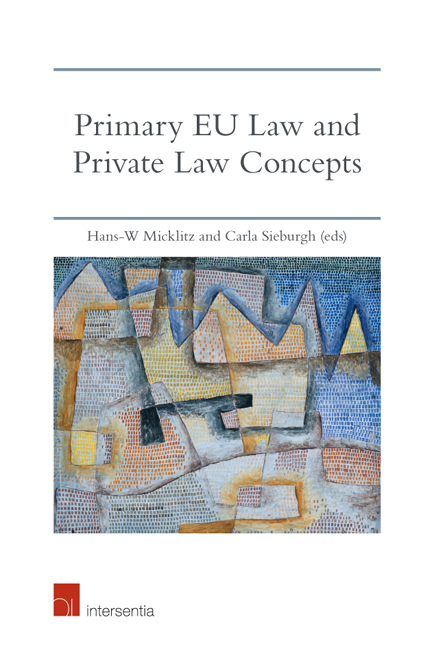Book contents
- Frontmatter
- Preface
- Summaries of the Chapters
- Contents
- Table of Cases: Alphabetical
- Table of Cases: Chronological
- List of Authors
- Chapter 1 Primary EU Law and Private Law Concepts
- Chapter 2 The Impact of Free Movement of Goods and Services on Private Law Rights and Remedies
- Chapter 3 The Impact of Free Movement of Capital on Private Law
- Chapter 4 The Impact of Competition Law on the Private Law Concepts of Nullity and Damages
- Chapter 5 The Impact of Article 101(2) TFEU Nullity on Private Law
- Chapter 6 The Impact of EU State Aid Law on National Private Law
- Chapter 7 The Impact of EU Intellectual Property Law and the Charter on Private Law Concepts
- Index
Summaries of the Chapters
Published online by Cambridge University Press: 27 September 2018
- Frontmatter
- Preface
- Summaries of the Chapters
- Contents
- Table of Cases: Alphabetical
- Table of Cases: Chronological
- List of Authors
- Chapter 1 Primary EU Law and Private Law Concepts
- Chapter 2 The Impact of Free Movement of Goods and Services on Private Law Rights and Remedies
- Chapter 3 The Impact of Free Movement of Capital on Private Law
- Chapter 4 The Impact of Competition Law on the Private Law Concepts of Nullity and Damages
- Chapter 5 The Impact of Article 101(2) TFEU Nullity on Private Law
- Chapter 6 The Impact of EU State Aid Law on National Private Law
- Chapter 7 The Impact of EU Intellectual Property Law and the Charter on Private Law Concepts
- Index
Summary
Chapter 1 (Primary EU Law and Private Law Concepts), written by the editors, provides an explanation of the field of research, the approaches to its study and its backgrounds and aspirations. It adds observations which are to be presented around four important concepts of private law: (i) the person, (ii) property, (iii) contract and tort, and (iv) remedies. We shed light on lines of development and reasoning within current EU private law, which to our understanding build an explanatory framework and determine the direction of the debate in the near future. The no longer surprising finding is that in issues governed by primary internal market law, internal market interests tend to prevail over other interests. Primary internal market law transforms private law and horizontal legal relationships. This, however, is not the full story. At the same time, both expectedly and unexpectedly, room is created for further transformation. Once market freedoms are integrated, they open the door to fundamental rights issues. In their turn fundamental rights-related interests may be relied upon to open up the market. It is crucial to stress the double consequence of the instrumentalisation of private law. The introduction of internal market law in horizontal relationships provides for a chance to introduce fundamental rights issues. The relation to the open market enables judges and parties to review a horizontal relationship against a broad spectrum of interests. Therefore it is possible that interests derived from human rights, including the social, will be (re-)embedded.
The foundational result is that primary EU law reshapes key concepts of private law. The notion of the person is broken down into identities, remains fragmented and serves to build the internal market. Property is interpreted broadly. The logical consequence is that property cannot be taken as absolute as it used to be. Second, the Court moves away from property and instead assesses cases from an (extra-)contractual perspective. The observations concerning the concept of contract and the concept of extra-contractual liability are detailed and diverse. The Court relies on two different techniques regarding both contract and extra-contractual liability. In the first place the concepts are determined by primary EU law in order to express precisely the aims of the internal market.
- Type
- Chapter
- Information
- Primary EU Law and Private Law Concepts , pp. vii - xxivPublisher: IntersentiaPrint publication year: 2017



